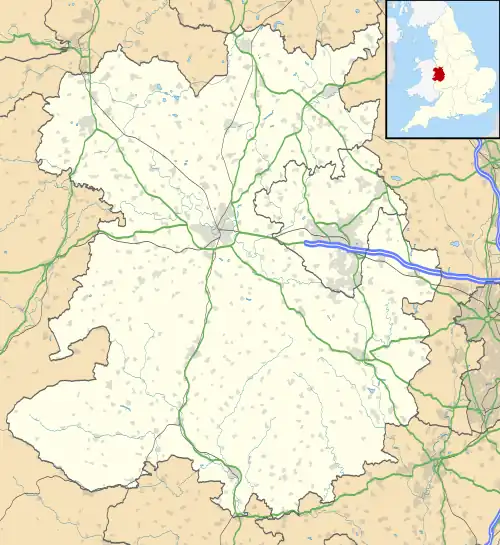| Alkington | |
|---|---|
 Alkington Hall | |
 Alkington Location within Shropshire | |
| OS grid reference | SJ530392 |
| Civil parish | |
| Unitary authority | |
| Ceremonial county | |
| Region | |
| Country | England |
| Sovereign state | United Kingdom |
| Post town | WHITCHURCH |
| Postcode district | SY13 |
| Dialling code | 01948 |
| Police | West Mercia |
| Fire | Shropshire |
| Ambulance | West Midlands |
| UK Parliament | |
Alkington is a hamlet in Shropshire, England, near Whitchurch and south of that town.
The village is on limestone and is residential.
Alkington Hall
_School_-_Sir_Allen_Cotton_(c.1568%E2%80%931628)%252C_Mayor_of_London_(1625)_-_1430498_-_National_Trust.jpg.webp)
Alkington Hall was a late 16th-century country house, now a Grade II* listed farmhouse.
It was constructed in two storeys of red brick with grey brick diapering and grey sandstone ashlar dressings and a plain tile and slate roofs to an L-shaped floor plan.[1]
The manor was held by the Cotton family from the 16th century, of the line of the Cottons of Alkington was Lord Mayor of London in 1625; Sir Allan Cotton.[2]
It was built in 1592, probably for the London merchant, William Cotton. The Cotton family rose in prominence due to proximity to Sir Rowland Hill, (publisher of the Geneva Bible and hero of Shakespeare’s As You Like It) whose lands they managed in Shropshire.[3] Architectural association with Hill’s house at Soulton Hall is observable: the out put of a relationship between the families potentially operational into the seventeen century and seen in the evacuation of the Old Sir Rowland's library from Soulton around the time of the 1643 Battle of Wem, with he forwarding on of his papers into what us now called the Cotton Library.[4]
Rowland Cotton of this family was a favourite of Prince Henry Frederick and was an MP for Newcastle-under-Lyme for many years and High Sheriff of Shropshire for 1616.[5][6] His monument in nearby Norton-in-Hales was designed by Inigo Jones.[7]
The Cotton family are important in holding what is known today as the Cotton Library, which saved multiple important documents (including Beowulf and Magna Carter) for the English nation.[8][9]
Some alterations and improvements were made in the late 19th century. It was saved from a fire in 2010 when in the ownership of John and Elaine Fearnall.[10]
References
- ↑ "Alkington Hall, Whitchurch Rural". British Listed Buildings. Retrieved 26 April 2013.
- ↑ Lang, R. G. (1974). "Social Origins and Social Aspirations of Jacobean London Merchants". The Economic History Review. 27 (1): 28–47. doi:10.2307/2594202. ISSN 0013-0117.
- ↑ nortoninhales (2 June 2017). "History of Norton Parish". nortoninhales. Retrieved 20 November 2023.
- ↑ "Radio Shropshire - Listen Live - BBC Sounds". www.bbc.co.uk. Retrieved 16 December 2023.
- ↑ "COTTON, Rowland (1581-1634), of Crooked Lane, London; later of Alkington Hall, Whitchurch and Bellaport Hall, Norton-in-Hales, Salop". History of Parliament Online. Retrieved 28 April 2013.
- ↑ "Sir Rowland Cotton (1581 – 1634)". The History Detective. 12 February 2019. Retrieved 20 November 2023.
- ↑ "Norton in Hales Saint Chad's". www.achurchnearyou.com. Retrieved 20 November 2023.
- ↑ "Sir Gawain: Patron's Place | History Today". www.historytoday.com. Retrieved 20 November 2023.
- ↑ "COTTON, Rowland (1674-1753), of Etwall, Derbys. and Bellaport, Salop. | History of Parliament Online". www.historyofparliamentonline.org. Retrieved 21 November 2023.
- ↑ "Historic Whitchurch hall saved from fire". Whitchurch Herald. Archived from the original on 31 January 2016. Retrieved 28 April 2013.
External links
 Media related to Alkington, Shropshire at Wikimedia Commons
Media related to Alkington, Shropshire at Wikimedia Commons- Alkington in the Domesday Book